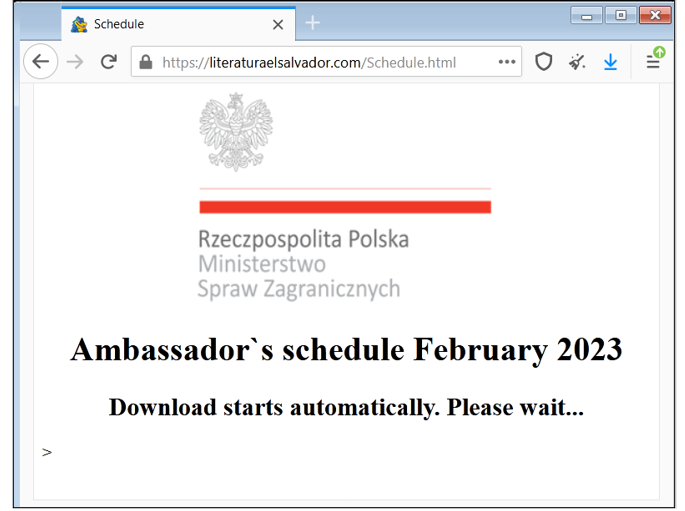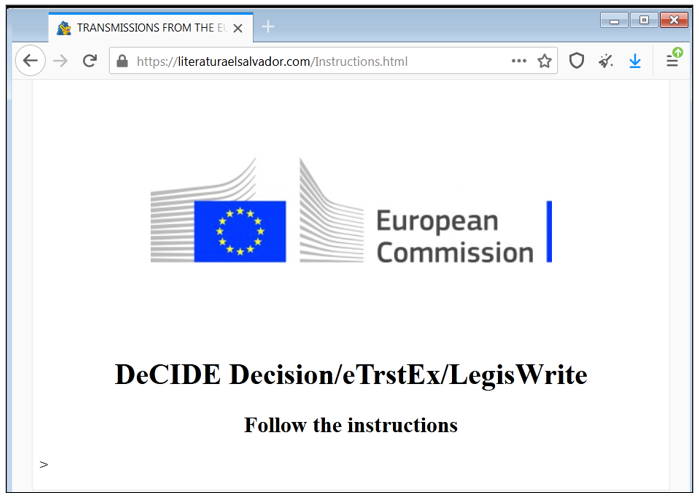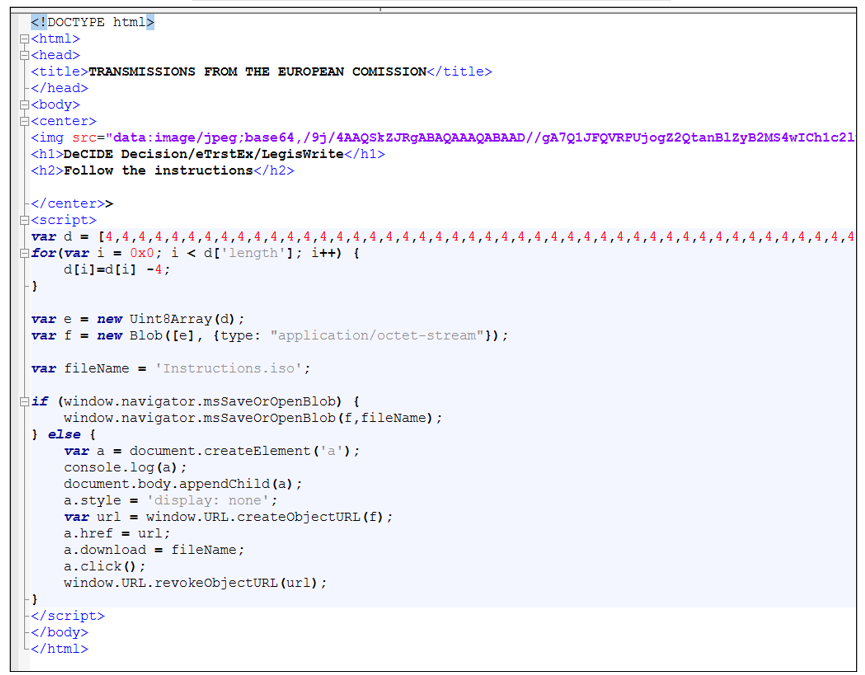
Summary
NOBELIUM, aka APT29, is a sophisticated, Russian state-sponsored threat actor targeting Western countries. At the beginning of March, BlackBerry researchers observed a new campaign targeting European Union countries; specifically, its diplomatic entities and systems transmitting sensitive information about the region’s politics, aiding Ukrainian citizens fleeing the country, and providing help to the government of Ukraine.
Brief MITRE ATT&CK Information
Tactic | Technique |
Resource Development | T1584.006 (Compromising legitimate web servers to spread downloaders) |
Initial Access | T1566.002 (Spear-phishing email with link to malicious website) |
Execution | T1204.002 (Malicious .lnk files inside of weaponized ISO images) |
Persistence | T1547.001 (Execution through Autorun) |
Defense Evasion | T1027.006 (Malicious HTML obfuscation) |
Command-and-Control | T1102.002 (Communicating via Notion API) |
Weaponization and Technical Overview
Weapons | Obfuscated html files, iso files, .lnk files, DLL 64 bits |
Attack Vector | Spear-phishing |
Network Infrastructure | Compromised legitimate websites. |
Targets | Diplomatic entities |
Technical Analysis
Context
NOBELIUM is an advanced persistent threat group also known as APT29, which is publicly attributed to the Russian government and specifically to the Foreign Intelligence Service of the Russian Federation (SVR), an organization responsible for collecting intelligence outside Russia, including electronic surveillance.
Although its phishing campaigns aren’t very sophisticated, APT29 is notorious for its agility once it is inside a target’s network. Its operators are known to be stealthy, extremely patient, and skilled in utilizing innovative intrusion techniques that abuse Microsoft technologies and services. The threat group made international news headlines back in December 2020 when a high-level supply chain attack Trojanized a software update to SolarWinds Orien software. The compromise affected thousands of users, distributing a backdoor dubbed SunBurst.
The new NOBELIUM campaign BlackBerry observed creates lures targeted at those with interest in the Ministry of Foreign Affairs of Poland’s recent visit to the U.S., and abuses the legitimate electronic system for official document exchange in the EU called LegisWrite. It partially overlaps with a previous campaign discovered by researchers in October 2022.
NOBELIUM is also known as Cozy Bear and The Dukes, and industry reporting has previously referred to the threat group as StellarParticle, UNC2452, and Dark Halo. NOBELIUM has historically targeted government organizations, non-governmental organizations, think tanks, military, IT service providers, health technology and research, and telecommunications providers.
Attack Vector
The infection vector for this particular campaign is a targeted phishing email containing a weaponized document. The malicious document includes a link leading to the download of an HTML file.
- hxxps[:]//literaturaelsalvador[.]com/Instructions[.]html
- hxxps[:]//literaturaelsalvador[.]com/Schedule[.]html
The weaponized URLs shown above are hosted on a legitimate online library website based in El Salvador in Central America. We believe that the threat actor compromised this website sometime between the end of January 2023 and the beginning of February 2023.
One of the lures appeals to those who want to find out the Poland Ambassador’s schedule for 2023. It overlaps with Ambassador Marek Magierowski’s recent visit to the United Statesp; specifically, his talk on February 2, where he discussed the war in Ukraine at the Catholic University of America Columbus School of Law, also known as the Catholic Law, which is based in Washington, DC.

Figure 1: Visual lure masquerading as the Polish Ministry of Foreign Affairs
Another lure we found abuses multiple legitimate systems, including LegisWrite and eTrustEx, which the EU nations use for information exchange and secure data transfer.

Figure 2: Visual lure masquerading as the European Commission
LegisWrite is an editing program that allows secure document creation, revision, and exchange between governments within the European Union. The fact that LegisWrite is used in the malicious lure indicates that the threat actor behind this lure is specifically targeting state organizations within the European Union.
Further analysis of the malicious HTML file reveals it to be a version of NOBELIUM’s malicious dropper tracked as ROOTSAW, also known as EnvyScout. EnvyScout uses a technique known as HTML smuggling to deliver an IMG or ISO file to the victim’s system.
The HTML file delivered in this campaign contains a data block that can be decoded by subtracting 4. Upon decoding that data, we find that it has an “.ISO” file inside.

Figure 3: Contents of the weaponized HTML file
The “hxxps[:]//literaturaelsalvador[.]com/Instructions[.]html” link drops “Instruction.iso”, and the “hxxps[:]//literaturaelsalvador[.]com/Schedule[.]html” link drops “Schedule.iso”. Both of those “.iso” files each contain two files, with the same hash for both:
- BugSplatRc64.dll
- <Instruction||Schedule>.lnk
SHA256 MD5 | dffaefaabbcf6da029f927e67e38c0d1e6271bf998040cfd6d8c50a4eff639df 38b05aa4b5ba651ba95f7173c5145270 |
ITW File Name | Schedule.lnk, Instructions.lnk |
Compilation Stamp | 2023-02-08T17:40:55.2737760+00:00 |
File Type/Signature | Windows shortcut |
File Size | 1488 bytes |
Command Line Argument | BugSplatRc64.dll,InitiateDs |
The purpose of the “.lnk” file is to run the specified command line argument:
- C:Windowssystem32rundll32.exe BugSplatRc64.dll,InitiateDs
SHA256 MD5 | e957326b2167fa7ccd508cbf531779a28bfce75eb2635ab81826a522979aeb98 cf36bf564fbb7d5ec4cec9b0f185f6c9 |
ITW File Name | BugSplatRc64.dll |
Compilation Stamp | 2023-02-07 13:02:42 UTC |
File Type/Signature | x64 PEDLL |
File Size | 271360 bytes |
The BugSplatRc64.dll file contains many encrypted strings which are decrypted at runtime. Some of the those decrypted strings are as follows:
- BugSplatRc64.dll,InitiateDs” C:WindowsSystem32rundll32.exe”
- SoftwareMicrosoftWindowsCurrentVersionRun
- authorization: Bearer secret_X92 sXCVWoTk63aPgGKlPBBmHVmuKXJ2geugKa7Ogj7s
- notion-version:
- 2022-06-28 accept: applicat ion/json..
Continuing with its execution, a new directory is created under “C:Users<username>AppData”, where the BugSplatRc64.dll is copied over.
- C:Users<username>AppData DsDiBacksBugSplatRc64.dll
To remain persistent on the infected system, a new registry key is created under: “HKEY_CURRENT_USERSoftwareMicrosoftWindowsCurrentVersionRunDsDiBacks”, with the value of “C:WindowsSystem32rundll32.exe “C:Users<username>AppDataLocalDsDiBacksBugSplatRc64.dll,InitiateDs”.
The BugSplatRc64.dll file aims to collect and exfiltrate information about the infected system. That includes basic data such as the owner’s username and IP address. This information is then used to create the victim’s unique identifier, which it then sends to the command-and-control (C2) server, Notion, which we’ll go into more detail on below.
Every minute (62000ms), the BugSplatRc64.dll connects to the Notion server, waiting for the next payload. If successful, the payload is executed as a shellcode in the memory of its process.
Network Infrastructure
This campaign’s malware delivery is based on the use of legacy network infrastructure that has been compromised by the threat actor. Using a compromised legitimate server to host the packed malware payload increases the chances of a successful installation on the victims’ machines.
The packed malware utilizes “api.notion.com” for its C2 communication. “Notion” is a commonly used note-taking application. By using Notion’s application programming interface (API) for C2, the threat group are giving their traffic a benign guise.
NOBELIUM has a history of utilizing compromised C2 servers, such as those hosted in the Microsoft® Azure® cloud infrastructure, to make their malicious C2’s look legitimate. Notion was also used during their November 2022 campaign, further aligning this campaign’s tactics, techniques and procedures (TTPs) with APT29.
This version of Notion is specified in the headers as “2022-06-28″, and is the latest version of the API. In a campaign conducted in January 2022, NOBELIUM was still using the Trello API for C2 communication. Use of Notion’s API didn’t begin until late in 2022, leaving the middle of 2022 for the implementation of this new C2 feature.

Figure 4: Notion C2 POST method example
Targets
Based on the current geopolitical situation involving Russia’s invasion of Ukraine, the visit of Poland’s Ambassador to the United States and his talk about the war, and the abuse of the online system used to exchange documents inside the European Union, we believe the target of NOBELIUM’s campaign is Western countries, especially those in Western Europe, which provide help to Ukraine.
Conclusions
NOBELIUM actively collects intelligence information about the countries supporting Ukraine in the Russian-Ukraine war. The overlap between Poland’s Ambassador’s visit to the United States with the lure used in the attacks, provides evidence that the threat actors carefully follow geopolitical events and use them to increase their possibility of a successful infection.
Furthermore, our initial analysis of weaponized LNK files shows that the threat actor behind this campaign used anti-forensic techniques to wipe out personal metadata to remove information connected to its operations systems.
Using compromised legitimate network infrastructure and a legitimate web server increases NOBELIUM’s technical capabilities to bypass basic network security mechanisms. However, an actionable Threat Intelligence model with counter-measure rules such as Suricata, will help to detect malicious traffic from the internal network to the threat actor’s network infrastructure.
For similar articles and news delivered straight to your inbox, subscribe to the BlackBerry blog.
APPENDIX 1 – Indicators of Compromise (IoCs)
SHA256 MD5 | 21a0b617431850a9ea2698515c277cbd95de4e59c493d0d8f194f3808eb16354 67a6774fbc01eb838db364d4aa946a98 |
SHA256 MD5 | 505f1e5aed542e8bfdb0052bbe8d3a2a9b08fc66ae49efbc9d9188a44c3870ed E693777A3A85583A1BBBD569415BE09C |
SHA256 MD5 | c1ebaee855b5d9b67657f45d6d764f3c1e46c1fa6214329a3b51d14eba336256 89f716d32461880cd0359ffbb902f06e |
SHA256 MD5 | dbb39c2f143265ad86946d1c016226b0e01614af35a2c666afa44ac43b76b276 e0cb8157e6791390463714b38158195a |
SHA256 MD5 | e957326b2167fa7ccd508cbf531779a28bfce75eb2635ab81826a522979aeb98 cf36bf564fbb7d5ec4cec9b0f185f6c9 |
SHA256 MD5 | 3a489ef91058620951cb185ec548b67f2b8d047e6fdb7638645ec092fc89a835 8d5c0f69c1caa29f8990fbc440ab3388 |
SHA256 MD5 | 4d92a4cecb62d237647a20d2cdfd944d5a29c1a14b274d729e9c8ccca1f0b68b 82ecb8474efe5fedcb8f57b8aafa93d2 |
IP | 108[.]167.180[.]186 |
URL | hxxps[:]//literaturaelsalvador[.]com/Instructions[.]html |
URL | hxxps[:]//literaturaelsalvador[.]com/Schedule[.]html |
SHA256 MD5 | dffaefaabbcf6da029f927e67e38c0d1e6271bf998040cfd6d8c50a4eff639df 38b05aa4b5ba651ba95f7173c5145270 |
APPENDIX 2 – Applied Countermeasures
Yara Rules
rule NOBELIUM_SpyDLL_March2023 $1807379073_247 = { 8B ?? ?? ?? ?? ?? ?? 48 ?? ?? ?? ?? 48 ?? ?? ?? ?? E8 ?? ?? ?? ?? 48 ?? ?? ?? ?? 48 ?? ?? 48 ?? ?? ?? ?? 4C ?? ?? ?? ?? ?? ?? ?? 48 ?? ?? ?? ?? ?? ?? ?? 48 ?? ?? ?? ?? ?? ?? ?? 89 ?? ?? ?? ?? ?? ?? 48 ?? ?? ?? 4C ?? ?? ?? ?? F7 ?? E8 ?? ?? ?? ?? 4C ?? ?? ?? ?? 48 ?? ?? 48 ?? ?? ?? ?? ?? ?? ?? 0F 10 ?? ?? ?? E8 ?? ?? ?? ?? 4C ?? ?? ?? ?? 48 ?? ?? 48 ?? ?? ?? ?? ?? ?? ?? 4C ?? ?? ?? ?? 48 ?? ?? ?? ?? E8 ?? ?? ?? ?? 48 ?? ?? ?? ?? 8B ?? ?? ?? 89 ?? 49 ?? ?? 89 ?? 49 ?? ?? 49 ?? ?? 48 ?? ?? 48 ?? ?? ?? ?? 4C ?? ?? 4C ?? ?? 48 ?? ?? ?? ?? 48 ?? ?? ?? ?? 48 ?? ?? ?? ?? 48 ?? ?? ?? ?? 48 ?? ?? ?? ?? 0F 11 ?? ?? ?? 4C ?? ?? ?? ?? 48 ?? ?? ?? ?? E8 ?? ?? ?? ?? 9? 0F 10 ?? ?? ?? ?? ?? ?? 48 ?? ?? ?? ?? ?? ?? 5? 5? 5? 5? 41 ?? 41 ?? 41 ?? C3 } condition: |
APPENDIX 3 – Deobfuscated Strings
000000006BBC3040 01 00 00 00 00 00 00 00 77 69 6E 69 6E 65 74 00 ……..wininet. 000000006BBC3150 5C 44 73 44 69 42 61 63 6B 73 5C 00 00 00 00 00 DsDiBacks….. 000000006BBC33F0 01 00 00 00 00 00 00 00 72 65 73 75 6C 74 73 00 ……..results. 000000006BBC37E0 6F 62 6A 65 63 74 00 00 00 00 00 00 00 00 00 00 object………. |
Related Reading
![]()
Source: https://blogs.blackberry.com/en/2023/03/nobelium-targets-eu-governments-assisting-ukraine
